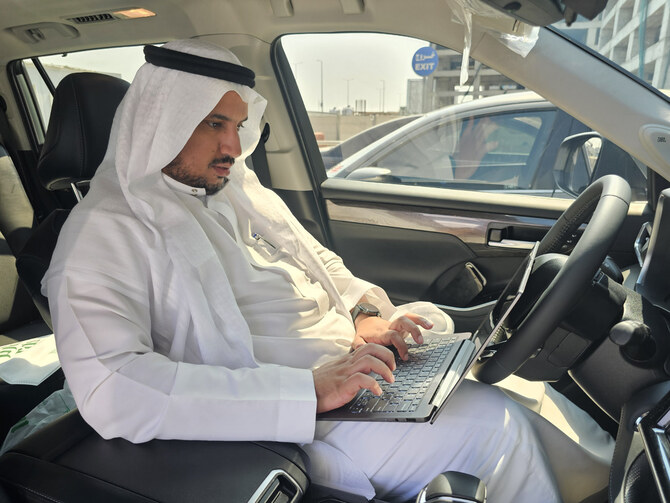JEDDAH: Nasser Mansour Al-Khaldi is the researcher and automotive expert behind the Saudi-made version of an innovative artificial intelligence self-driving system that can be fitted to regular cars.
A native of Taif province, his passion for technology started at a young age through attempts to customize video games — including hacking his Xbox 360.
Since 2015, he has been focusing on autonomous driving technology — self-driving systems powered by AI. In 2023, the results of his efforts became apparent when he launched the first autopilot system in the Kingdom.

Al-Khaldi and his team — in cooperation with their partner, California-based startup Comma.ai — have developed an open-source software that runs the system, allowing motorists to install a driver-assist feature. The software enables the car to drive itself on motorways, staying in one lane and keeping a safe distance from the car in front, and to follow the vehicle immediately in front in traffic without human assistance.
“It took me around five years to develop a device that records vehicle data in order to analyze it and add more advanced safety and smart driving systems to existing vehicles on the market,” Al-Khaldi told Arab News.
“Yes, it is made in collaboration with our partner in the US, but we upgraded our own version and it has more features. So, you can say it is ‘made in Saudi Arabia’ by a very intelligent Saudi team,” he added.
DID YOUKNOW?
• The Saudi-made AI driver-assistance system was trained on over 100 million miles.
• It incorporates AI-driven real-time analysis, using cameras and radar to prevent collisions.
• It is compatible with more than 64 car models not supported by Comma.ai’s original tech.
• The Saudi-made device has been exported to the US, Europe, Africa, and the Arab world.
Although the base technology, Open Pilot, was developed by Comma.ai, Al-Khaldi explained that his version has been significantly developed to align with local needs, expanding compatibility to work with more than 64 car models not supported by the original.
The Saudi programmer also developed the autonomous driver technology to function at low speeds, improving its effectiveness in the stop-start traffic that is common in the Gulf region.
He explained that the self-driving device “leverages AI and remote sensing technology to continuously analyze and understand the vehicle’s surroundings.”

Aside from developing Saudi Arabia's first autopilot system, Nasser Mansour Al-Khaldi is the researcher also developed the autonomous driver technology to function at low speeds, improving its effectiveness in the stop-start traffic. (Supplied)
The unit has been on the Saudi market for about a year and a half, and approximately 500 have been sold, according to Al-Khaldi.
“In addition to our presence in the Saudi market, we have also exported our device — which can be adapted to almost any modern car — to the US, Europe, Africa and other parts of the Arab world,” he added.
Arab News joined 29-year-old Al-Khaldi to experience the driver-assistance system, which is installed in his Toyota Highlander. We began the ride on the highway north of Jeddah.
The results were impressive. From the driver’s seat, with his hands removed from the steering wheel, Al-Khaldi said: “At this point our (system) can handle all types of curves. On the highway, you can drive for hours without any user intervention. I just drove from Taif to Jeddah on curvy, hilly roads without any user intervention.”
Opinion
This section contains relevant reference points, placed in (Opinion field)
Al-Khaldi said that the system integrates multiple components to provide “a safe and efficient autonomous driving experience,” controlling steering, acceleration, and braking. It uses open-source AI technology, trained on over 100 million miles and able to adapt to a variety of driving conditions.
“The system relies on high-resolution cameras and radar sensors to detect lanes, track nearby vehicles, and analyze data in real time. This analysis helps prevent collisions and ensures the vehicle stays in its lane,” he explained.
“One of our customers who lives in the US installed our device in his car and recently, while driving down a long stretch of highway heading to another state, he lost consciousness and the car drove itself for two hours until he woke up. He later messaged us and expressed his thanks for our device’s reliability,” he added. “Following this event, the system received an enhanced safety update. Now, if the driver’s eyes remain fixed and unresponsive, signaling potential loss of consciousness, the system prompts the driver to touch the steering wheel, providing an additional layer of safety during medical emergencies like seizures or sudden loss of consciousness.”

Inspired by his team's successes, Nasser Mansour Al-Khaldi now envisions a future where AI powers self-driving cars across the Kingdom. (SPA photo)
According to the US website Consumer Reports, Open Pilot is currently the most advanced driver-assistance system (ADAS) on the market.
Al-Khaldi and his team are now exploring ways to tailor the system to various levels of driving experience. “I think we’ll find better ways of doing it that will be simpler and allow more users access to the technology,” he said.
Al-Khaldi envisions a future where AI powers self-driving cars across the Kingdom. He said: “Saudi Arabia has an ambitious vision that embraces artificial intelligence technologies. Self-driving has become one of the most important AI tools.”

































